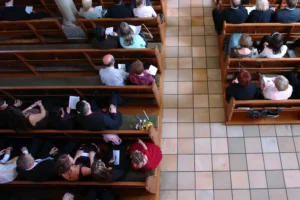You could see the passion in her eyes. For the first time in her life she really felt like she was doing what God wanted for her. She had found her calling in life, and it gave her renewed excitement in her walk with Jesus. To use the overused cliché, she was on fire. You see, my friend had just returned from a week-long missions trip to Honduras. While there, she saw firsthand the darkness of poverty, and she came home a changed woman. She wanted to make a difference — to effect change in the hardest to reach places. She immediately began planning for her life after college.
As we talked about her trip and what God had done in her heart over spring break there was a common refrain throughout our conversation: She wanted to do big things for Jesus, and going back to Honduras seemed to be the perfect fit. Never mind the fact that the week before she left she was sleeping in on Sunday mornings and counting her personal devotional time as her “church time.” She had no problem with her behavior outside of her all-important ministry, because to her, it was the “big things” she was doing for Jesus that ultimately mattered, not her lack of commitment to any particular local church.
Her response was really no different than countless responses I heard over the years at my conservative Christian college. Nearly every semester there would be a panel of earnest college students excited to share about their most recent ministry accomplishment. Some spent their Friday nights evangelizing homeless men and women downtown. Others put their college education to work by tutoring Somali refugees or teaching ESL classes. Every spring break dozens of students embarked on missions trips. But if you were to look for these same students in your local church on a Sunday morning, you might find the pew noticeably empty.
I began to notice a disconnect between the desire to “do something for Jesus” and commitment to the local church. Many friends of mine were all about going on a missions trip, helping the homeless or sponsoring a Compassion child (which are all really, really good things), but often they were apathetic to the local church. If they were even regular attenders somewhere on a Sunday morning, their commitment to the church was limited to the late service usually filled with college students.
It all felt a little disjointed to me. But were my feelings legitimate? Or does it even matter if these students involve themselves with a local body of believers? After all, it’s what they do for Jesus that really counts, right? There is a lost and dying world out there, and if they are doing something about it, quibbling over their name and picture being listed in a church directory somewhere seems a bit silly.
But is it?
The Value of the Church
College and young adulthood is a transient time. For many, they are either busy with homework, trying to figure out their career path, or in between their parents’ house and their very first apartment. There is a lot up in the air in this season of life. So it might seem easier to just use the remaining energy you have and expend it on the ministry you’re passionate about. Belonging to a local church might feel to you like an unnecessary obstacle or box to check. But it’s so much more than that.
The local church actually provides the necessary safety net that all of us, especially vulnerable college students and young adults, need. It is within the local church that we not only hear the Word of God preached, but see it applied in our daily lives. It is here that we are given the tools for ministry, the resources to serve, and the fellowship and support that we all desperately need as we walk through this Christian life.
Often people will point to Jesus’ ministry as their example for renegade ministry work. But what was the mission of Jesus, really? The ministry of our Christ was always tied to making a people for himself. Yes, He spoke against the religious establishment of the day, but they were not even doing the will of God anyway. And when Jesus set forth His ministry for His people, it was always within the context of building a people, a new set of followers.
If we look at the New Testament epistles, almost all of them were written to churches or pastors of churches. After Jesus ascended into heaven the apostles immediately began establishing local bodies of believers who worshipped together, strengthened one another and went out together to proclaim the good news of Jesus Christ. Jesus, and His messengers, cared a lot about the establishment and continued growth of the local church. God never intended for us to be lone rangers. Even Paul, the greatest of all apostles, most often traveled with another believer, and he always was about strengthening local churches.
In their book, Why We Love the Church, Kevin DeYoung and Ted Kluck have this to say about the Bible’s emphasis on the local church:
We know from Acts 2:42 that the first Christians met together regularly for teaching, fellowship (possibly the word for taking a collection), the Lord’s Supper, and prayer. We know from 1 Corinthians 12-14 that public worship was an important part of the life of the church. We see in 1 Timothy 4:13 that there were regular times for the public reading of Scripture. In 1 Corinthians 11:18 we read instructions for ‘when you come together as a church’ that was not the same as a few Christians hanging out and talking about Jesus…Later in 1 Corinthians 16 we read instructions for setting aside a collection ‘on the first day of the week,’ suggesting that the church at Corinth met for services of worship every Sunday. And in Hebrews 10:25 we are commanded not to neglect to meet together (literally, do not forsake the assembly of yourselves). The word for ‘meet together,’ episynagogen, does not refer to Christian friends reading their Bibles together but to the formal gathering of God’s people for worship. So, no, you can’t stop going to church and still be the church.
The Bible has a lot to say about the local church. Belonging to a local body of believers is not a throwaway concept. It’s a necessary part of what it means to be a believer. But what about my friend who feels called to go back to Honduras? Was she wrong for desiring this ministry? That’s why the Bible’s not silent on ministry involvement either.
The Value (and Danger) of Ministry
The fact that countless young people are jumping on the missions/justice bandwagon for Jesus is not something to be ignored. It actually reveals something much deeper. College and young adulthood is a time of great self-reflection. For the first time in your life, you might be thinking about the Bible and growing in godliness outside of the context of your family unit. You might be awakened to the great needs in this world. The blinders have come off, and coupled with your new found passion for Jesus you might be ready (and able) to go out and serve. This is a good and valuable asset to the family of God.
But what is ministry, really? Often when I hear young people talk about their desire for ministry they speak in terms of “doing big things” for God. Who doesn’t want that? But what can happen when we think only in these categories is that we start to see establishing an orphanage in Kenya as the pinnacle of ministry greatness. The reality is that most of us will never be the catalyst in ending world hunger or human trafficking (though we certainly could try). But we might be the man or woman who spends our entire life wiping snotty noses in the church nursery or visiting the elderly in our local church. The danger of treating ministry in terms of bigness or greatness is that we are actually setting ourselves up for disappointment in the long run. Yes, we should dream big and work hard especially for the glory of God. But faithfulness in the ministry God has called us to, whether big or small, is what God is after. He wants our hearts, and He will take care of the results.
And that is why ministry and the church must go together.
Why We Need Them Both
The passion for ministry and commitment to a local church are not mutually exclusive. In fact, they must go together. You can’t be all about the mission of Jesus and not be all about the mission of His bride.
When we only think in terms of spring break missions trips or weekly evangelism outings with our college friends, we can start to think that our good actions trump our bad behavior. If you volunteer with International Justice Mission or sponsor a Compassion child, this good work actually outweighs the fact that you can’t hold a job or are wasting your days away playing video games. And that’s where the local church comes in.
The local church provides the accountability, fellowship and truth that we so desperately need. We have to get away from the mentality that it’s “just me and Jesus.” It’s not. Yes, Jesus loves you. But He also loves the church, His bride for whom He died. The Bible actually talks about the church being the very body of Jesus. And I’ve heard it said that we dare not say to Jesus, “It’s not You I hate, it’s just Your body I can’t stand.” When we neglect the local church, we are actually neglecting our Savior.
He has big plans for you that do not start first with your exotic missions trip or urban ministry. Jesus’ mission for your life is first and foremost to make you holy, and one of the primary ways He accomplishes this mission is through the local church. Our ministry to this lost and dying world should never be divorced from the church — and more importantly, the local congregation that you belong to.
Now What?
If you’re single, you have the greatest opportunity here. The passion you feel to get out there and do something for Jesus can actually serve as the fuel for fearless ministry within your local church. College students and young adults, especially because of the freedom of their season of life, should be the most committed to the local church. You can take all of your excitement, all of your passion, all of your vision for changing the world for Jesus and bring it into a local body of believers and serve with boldness. It might sound really scary at first, especially if your only context for the local church is one of backstabbing and boredom. And the reality is it’s a lot easier to be involved with other good things for Jesus, but not be involved with the church because the church can sometimes be really messy. But that’s the beauty of it all. When redeemed sinners join with other redeemed sinners to worship, serve and be changed by God’s Word, good things happen for everyone involved because that’s the way God designed it to be.
So join a church. Get involved in ministry. And watch God work. I promise you won’t be disappointed.
Copyright 2012 Courtney Reissig. All rights reserved.












